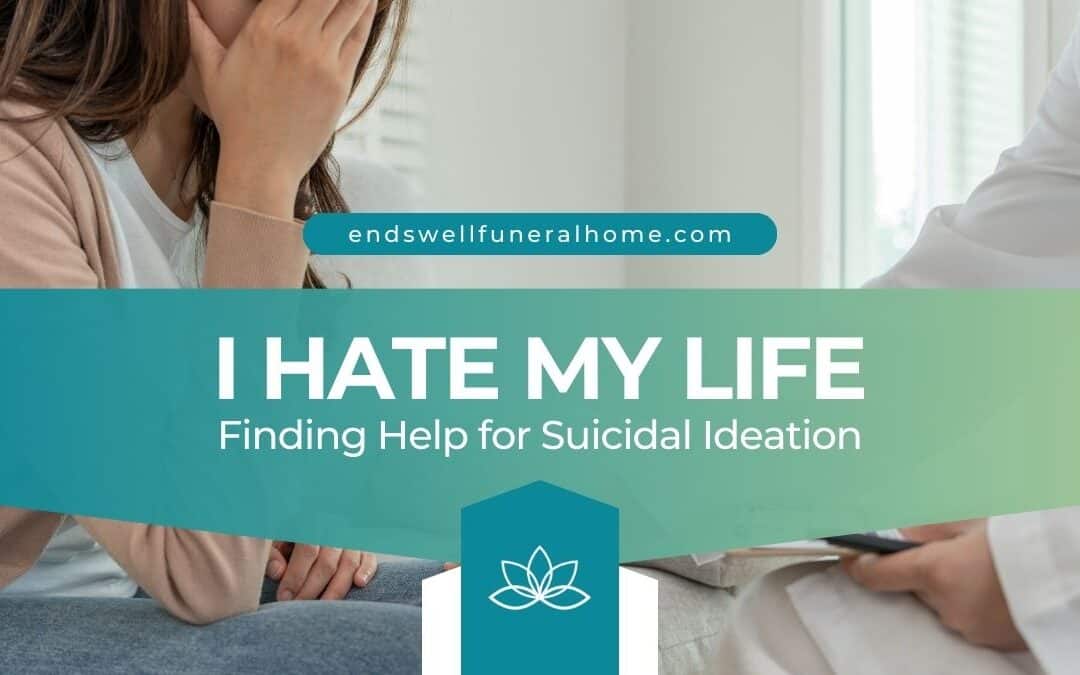When life feels unbearable, and you find yourself saying, “I hate my life,” it can feel like you’re drowning in a sea of hopelessness. We’re here to remind you that you’re not alone in this, even though it can seem like no one else understands.
Sometimes, the weight you’re carrying makes it hard to even imagine a way out, but together, we can find steps toward relief and healing.
Talking about suicidal thoughts can be difficult, but starting that conversation is often the first step toward regaining control over your life. You deserve to feel supported, and help is within reach.
What Causes Suicidal Thoughts?
Suicidal thoughts are complicated and often stem from multiple areas of our lives, affecting our mental and physical health.
When you feel trapped in a cycle of despair, it’s hard to see the way forward. So, let’s break down some common causes of suicidal thoughts and how they may be affecting your life.

Emotional Pain and Mental Health
Many of us struggle with overwhelming emotional pain, often rooted in mental health challenges like anxiety or depression. These conditions can make daily life feel unbearable as if there’s no escape from the constant pressure.
If you’re feeling stuck in a negative mood or constantly thinking about your feelings of failure, it’s easy to spiral into thoughts of self-hatred and hopelessness.
It’s important to remember that these feelings are often symptoms of a larger mental health issue—something a mental health professional can help you address.
However, you’re not alone in suffering from mental health disorders. The following are the rates of past year prevalence of mental illnesses in U.S. adults according to the NIH:
- Anxiety disorders: 19.1%
- Major depression: 8.3%
- Post-traumatic stress disorder (PTSD): 3.6%
- Bipolar disorder: 2.8%
- Borderline personality disorder (BPD): 1.4%
- Binge eating disorder: 1.2%
- Obsessive-compulsive disorder (OCD): 1.2%
- Schizophrenia: 0.25 -0.64%
Read more statistics about mental health in the U.S. here.
Stress, Trauma, and Life Events
Stressful or traumatic life events can also contribute to suicidal thoughts. Losing a job, a significant relationship, or even facing a crisis within the family can trigger feelings of despair.
Many of us struggle with the weight of these moments, feeling ashamed or like we’ve failed in some way. Over time, the stress can build up, leading to a breaking point where you feel overwhelmed and begin to lose hope.
These events can make it feel like you’re stuck, but they don’t define your future.

Physical Health and Substance Abuse
Your physical health can have a significant impact on your mental state.
- Chronic pain, illness, or fatigue can lead to feelings of unhappiness or even anger toward your body. When your physical health is compromised, it can drain your energy and leave you feeling disconnected from the world around you.
- Substance abuse often fuels difficult emotions, clouding your judgment and increasing feelings of dissatisfaction with life. In the long run, this can lead to self-harm or a deep sense of self-hatred.
Relationships and Social Isolation
Feeling isolated from the people around you can deepen those thoughts of “I hate my life.” Most people need strong relationships to feel a sense of belonging.
When relationships with family, friends, or romantic partners are strained—or when we spend too much time alone—it’s easy to feel as though nobody understands what you’re going through.
Isolation can intensify negative feelings, and without a support system, you may feel like there’s no way to stop hating your life.
Unmet Basic Needs and a Sense of Hopelessness
Finally, when our basic needs aren’t being met, whether it’s financial stability, physical safety, or emotional security, life can feel like an endless battle.
We all need a sense of purpose and security to feel good about our existence. When those needs are not fulfilled, it’s common to feel like there’s no point in living or that life will never get better.
Understanding that these feelings and thoughts come from a complex mix of mental, physical, and emotional factors is crucial. Suicidal thoughts don’t define you, and with the right help and support, you can find hope again.
Preventing Suicide
Suicide prevention is about connection, understanding, and showing others that they aren’t alone.
If you know someone who is considering suicide, you may feel overwhelmed, unsure of what to do, or afraid of saying the wrong thing. But stepping in to help can make a world of difference.
Together, we can learn how to be there for someone in their darkest moments and guide them toward safety.
Recognizing the Warning Signs
The first step in preventing suicide is recognizing when someone is struggling. Some signs are more obvious, like openly talking about wanting to die or saying, “I hate my life.” These overt signs are cries for help.
Other signs of suicidal ideation may be subtle, such as:
- Withdrawing from social activities
- Changes in mood
- Increased use of substances like drugs or alcohol
You might notice them spending more time alone or showing signs of deep sadness or anxiety. If you’re seeing these behaviors, trust your instincts and reach out.
Take Action: FIND HELP if You See Overt Signs of Suicidal Thoughts
If you or someone you know is struggling with suicidal thoughts, don’t hesitate to reach out for help.
- Call, text, or chat 988 for help from the National hotline. Calls, texts, and chats bring confidential, 24/7 support from trained crisis counselors.
- There is also the Hopeline in North Carolina at 877-235-4525.
Together, we can prevent suicide and help those in crisis find the support they need to move forward. Let’s keep the conversation going and ensure that no one faces this battle alone.

Starting the Conversation
Opening up a conversation about suicide can feel intimidating, but it’s one of the most important things you can do. Ask them directly how they’re feeling and whether they’ve been thinking about harming themselves.
Be honest and gentle. You might say something like, “I’ve noticed you seem really down lately. Have you been feeling like giving up?”
Let them know you’re there to listen, without judgment, and that it’s okay to share how they’re truly feeling.
Listening and Offering Support
Once the conversation begins, your role is to listen.
Encourage them to talk and truly hear what they have to say. Try to avoid jumping to solutions right away or minimizing their feelings.
Let them know that whatever they’re going through, you’re here to support them. A simple “I’m right here with you,” can be incredibly powerful. This moment of connection can help them feel less isolated and more open to receiving help.
Encouraging Professional Help
While your support is crucial, it’s important to encourage them to talk to a mental health professional. Therapy can offer them the tools to navigate these thoughts and feelings in a healthy way.
You can offer to help them find a therapist, make an appointment, or even go with them if they’re nervous.
Let them know that talking to a professional doesn’t mean something is “wrong” with them—it’s a sign of strength, a way to take control of their mental health.
Staying Present and Following Up
Suicide prevention doesn’t end with one conversation. Keep checking in with them, especially if they’re going through a particularly tough time.
Ask how they’re doing, remind them that they matter, and continue to show that you’re there for them, no matter what.
Sometimes, just knowing someone cares can make all the difference in their ability to cope.
Finding Help with a Mental Health Professional in the Triangle
When you’re feeling trapped, thinking, “I hate my life,” it’s important to know that help is available.
Whether you’re feeling depressed, struggling with anxiety, or just dealing with life’s pressures, a mental health professional in the Triangle area of North Carolina can offer the support you need to find a way forward.
Let’s talk about what that help looks like and how it can make a difference in your life.
Talking Through Your Struggles
Sometimes, the hardest step is reaching out and talking honestly about what you’re going through. Whether you’re dealing with constant feelings of anger or dissatisfaction with your daily life, speaking with a therapist can help you better understand what’s driving those emotions.
This process gives you the chance to stop hating aspects of your life and your own feelings. By describing what’s happening inside your mind and body, you begin to get a clearer picture of why you feel the way you do.
Addressing Mental and Physical Health Together
Mental health doesn’t exist in a vacuum—your physical health can also have a huge impact on your mood and energy. If you feel unhappy or tired on a daily basis, it’s easy to start thinking that there’s something deeply wrong with your life.
A mental health professional can help you recognize how things like lack of sleep, chronic pain, or even diet can influence your emotional well-being. By addressing both your mind and body, you can begin to develop skills to deal with the stress and anxiety that build up over time.
Coping With Past Trauma and Emotional Pain
Many of us carry pain from the past—moments when we felt ashamed, betrayed, or hurt. These experiences can deeply affect how we act in the present. Therapy can help you deal with that emotional baggage by teaching you to recognize the impact of past events on your current mood and relationships.
When we spend too much time reliving negative moments, we can end up hating ourselves or feeling stuck. By facing these difficult emotions head-on, we can learn to cope in healthier ways and move forward.

Building a Path Toward Happiness and Stability
A mental health professional can help you develop a plan for finding happiness, one step at a time. It’s not about fixing everything overnight—it’s about making small, meaningful changes that improve your sense of well-being.
Whether it’s finding a new job, working through relationship issues, or developing a daily routine that supports your mental health, the right therapist can give you the tools to build a stable and fulfilling life.
Over time, you may find that the energy you once spent feeling dissatisfied or depressed is replaced with hope and forward momentum.
Grief Can Also Cause Depression and Anxiety
If you’ve lost a loved one recently, you may be feeling like there is no hope going forward. Grief can feel all-consuming, making it hard to find your way back to a sense of normal life.
You might be thinking, “I hate my life,” as the weight of loss presses down. Let’s explore how grief can lead to feelings of depression and anxiety and how you can start to heal.
Understanding the Connection Between Grief and Depression
Grief and depression often go hand in hand. Losing someone close to you can bring on intense feelings of sadness, emptiness, and even self-hatred. You may feel ashamed for not being able to “move on” or for struggling to find joy in the world around you.
But the truth is, feeling depressed after a loss is a normal part of the grieving process. It’s not about getting over it—it’s about finding ways to process that pain with the help of others who understand the depth of your emotions.
Grief can also trigger anxiety. You might start to worry more about your own life, health, or future. Questions can haunt your thoughts:
- “What if something else goes wrong?”
- “Will I ever feel okay again?”
- “Did I cause this to happen?”
- “Do I deserve to ever feel happy again?”
- “Does anyone need me anymore?”
These anxious feelings may seem overwhelming, but a grief support group or counselor can help you manage them by developing skills to cope with both the sadness and the fear that grief often brings.
At Endswell Funeral Home, we understand how grief can feel because we have experienced it personally. We’re here for you every step of the way. Aftercare is important after losing a loved one, so we provide referrals and help.
And if you need immediate assistance, reach out to us today to learn more about our services, including grief and support groups, and how we can help you find peace during this difficult time.
The Physical Toll of Grief
Grief doesn’t just affect your mind—it can also have a serious impact on your physical health. It’s common to feel drained of energy, struggle to sleep, or even experience physical pain as a result of emotional distress.
You might feel like you’re constantly carrying a heavy weight in your chest or stomach, making it hard to function on a daily basis. Talking to others who understand can help you stop hating your body’s reaction to grief and instead start finding ways to care for yourself during this difficult time.
Learning to Move Forward Without Forgetting
It’s important to understand that moving forward doesn’t mean forgetting the person you’ve lost.
We often feel like there’s something wrong with us if we start to experience moments of happiness after a loss, as though we’re betraying the memory of our loved one. But the reality is, it’s possible to honor their memory while also finding ways to live fully in the world.
Therapy can provide a space where you can talk openly about your grief, describe your pain, and begin to rebuild a life that feels meaningful.

Developing New Coping Skills
One of the hardest parts of grief is feeling stuck—like you’ll never be able to move forward. But grief doesn’t have to define your life forever. With the right support, you can learn new coping skills that help you manage overwhelming feelings.
Whether it’s through therapy, spending time with others who understand your pain, or finding new ways to express your emotions, you can begin to heal.
The idea isn’t to stop feeling the loss, but to find a way to live alongside it without letting it define you.
Moving Forward While Honoring the Past
The goal isn’t to “get over” the grief—it’s to find a way to move forward while still honoring the person you’ve lost. It’s about balancing the memory of the past with the ability to live fully in the present.
You’re not alone in this, and with the right help, you can start to find that balance again.
We Understand That Everyone Struggles Sometimes
At Endswell Funeral Home, we know that everyone struggles with life’s hardest moments. Whether it’s the loss of a loved one, feelings of uncertainty, or simply trying to make sense of it all, those moments can weigh heavily on your heart.
We are here to help you navigate through a time of loss with compassion and understanding, offering services that are designed to meet your needs and honor the life of your loved one in a meaningful way.
Helping You Find Peace in Difficult Times
Grief isn’t a straightforward journey. It’s often filled with ups and downs, moments of deep sadness, and times when you’re not sure how to move forward.
We know how hard it can be to cope with those feelings. We’ve experienced loss ourselves and we’ve worked with many families in the Triangle area who felt lost in the midst of their grief.
That’s why we offer compassionate grief counseling referrals, resources to help you plan, and packages that provide everything you need for a respectful and loving goodbye.
Supporting Your Eco-Friendly Values
At Endswell, we understand that many families today prioritize environmental sustainability as a core value. We respect your commitment to caring for the planet, and that’s why we’ve designed our funeral services to be as eco-friendly as possible.
Our offerings are not just about simplicity and affordability—they’re about ensuring that the choices you make reflect your dedication to environmental responsibility. Whether you choose green cremation, aquamation, or natural burial, our services are tailored to align with your values.
We believe that saying goodbye to your loved one should honor both their life and their belief in protecting the earth for future generations.
A Modern Approach to Funeral Care
Traditional funeral homes can often feel rigid, leaving families feeling like they’re stuck in a process that doesn’t align with their needs or beliefs.
At Endswell, we’re reimagining what funeral care can be. With our focus on transparency, affordability, and sustainability, we’ve created a model of care that reflects the values of the modern world.
Our goal is to take the stress and confusion out of the funeral process, allowing you to spend time focusing on what matters most—honoring the memory of your loved one.
We’re Here to Help
If you’re feeling overwhelmed or unsure of what to do next, we’re here for you. At Endswell Funeral Home, we believe that everyone deserves a thoughtful, personalized experience when planning after-life care. Let us help guide you through this process, offering support every step of the way.
Whether you’re looking to pre-plan or need immediate assistance, reach out to us today to learn more about our services and how we can help you find peace during this difficult time.
Contact us anytime to start the conversation.

